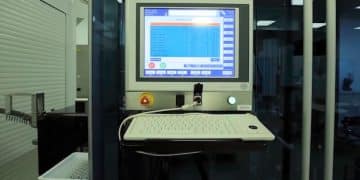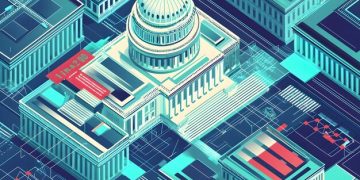Blockchain Technology: Real-World Applications in the US Beyond Crypto
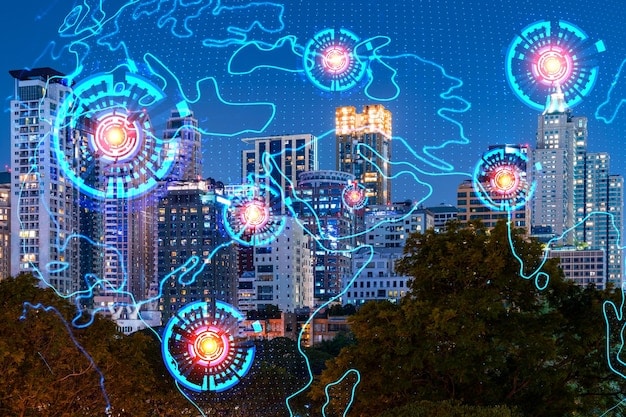
Blockchain technology extends far beyond cryptocurrency in the US, offering secure, transparent, and efficient solutions for supply chain management, healthcare, voting systems, and digital identity verification.
Blockchain technology, initially recognized as the backbone of cryptocurrencies like Bitcoin, has evolved into a versatile tool with numerous real-world applications in the US, transforming industries beyond the realm of digital currencies and offering innovative solutions.
Understanding Blockchain Technology
Blockchain technology is revolutionizing how data is stored and managed. It is essential to understand the core concepts behind this technology to fully appreciate its potential applications in the US.
At its core, a blockchain is a decentralized and distributed digital ledger. This means that instead of being stored in a single location, data is spread across a network of computers. Each piece of data, or transaction, is grouped into a block, and each block is linked to the previous one in a chronological chain. This creates a tamper-proof record that is transparent and secure.
Key Characteristics of Blockchain
Understanding the key characteristics is crucial to appreciating the transformative potential of blockchain technology in various industries.
- Decentralization: Blockchain operates on a distributed network, eliminating the need for a central authority.
- Transparency: All participants can view the blockchain, enhancing trust and accountability.
- Security: Cryptographic hash functions ensure data integrity and prevent tampering.
- Immutability: Once a block is added to the chain, it cannot be altered or deleted.
These characteristics make blockchain particularly attractive for applications requiring high levels of trust and security. The transparency and decentralization offered by blockchain can significantly improve efficiency and reduce fraud in various processes.
Blockchain provides a secure and transparent means of recording and verifying information, making it a game-changer for numerous sectors. The decentralized nature diminishes the risk of single points of failure and boosts system reliability.
Supply Chain Management
One of the most promising applications of blockchain technology in the US is in supply chain management. Blockchain can enhance transparency, traceability, and efficiency in complex supply chains.
In today’s global economy, supply chains are intricate networks involving numerous parties, from manufacturers and distributors to retailers and consumers. Tracking products through this network can be challenging, leading to inefficiencies, delays, and even fraud. Blockchain offers a solution by providing a shared, immutable record of each product’s journey.
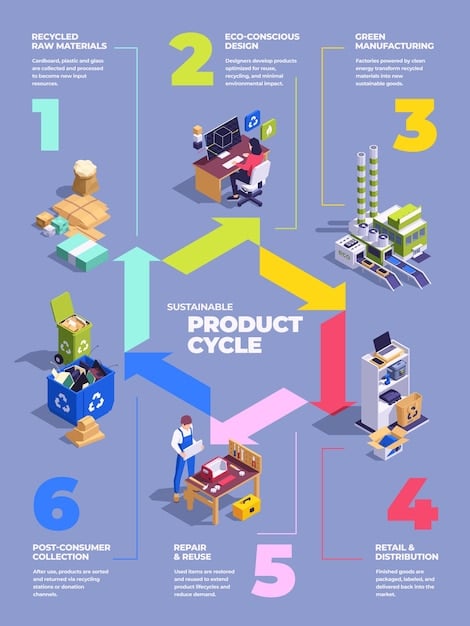
Enhancing Traceability
Blockchain enables companies to track products from origin to final delivery, ensuring authenticity and reducing the risk of counterfeiting. This is particularly valuable in industries such as pharmaceuticals and food, where product safety is paramount.
Improving Efficiency
By automating processes and reducing paperwork, blockchain can streamline supply chain operations and reduce costs. Smart contracts, self-executing agreements written into the blockchain, can automate tasks such as payment and delivery verification.
Walmart, for instance, has used blockchain to track the origin and movement of mangoes, reducing the time it takes to trace a product from farm to shelf from weeks to seconds. This not only improves efficiency but also enhances food safety.
Blockchain technology is transforming supply chain management by providing end-to-end visibility and accountability. This enables companies to optimize their operations, reduce costs, and improve customer satisfaction.
Healthcare Revolution
Blockchain technology has the potential to transform the healthcare industry in the US by enhancing data security, improving interoperability, and streamlining administrative processes.
The healthcare industry faces numerous challenges related to data management. Patient records are often scattered across different systems, making it difficult to share information securely and efficiently. Blockchain can provide a solution by creating a secure, decentralized platform for storing and sharing patient data.
Securing Patient Data
Blockchain ensures the privacy and security of patient data by using cryptographic techniques to protect sensitive information. Patients have greater control over their data and can grant access to healthcare providers as needed.
Improving Interoperability
By creating a standardized platform for data exchange, blockchain can improve interoperability between different healthcare systems. This allows doctors to access a complete and accurate picture of a patient’s medical history, leading to better treatment decisions.
For example, Medicalchain uses blockchain to create a secure and transparent platform for managing patient health records. Patients can control who has access to their data, and healthcare providers can collaborate more effectively.
Blockchain is revolutionizing healthcare by providing a secure, interoperable, and patient-centric platform for managing medical data. This can lead to improved patient outcomes and reduced healthcare costs.
Secure Voting Systems
Blockchain technology offers a promising solution to enhance the security and transparency of voting systems in the US. This technology can address many of the challenges associated with traditional voting methods.
In recent years, there has been increasing concern about the integrity of elections. Traditional voting systems are vulnerable to fraud, tampering, and technical glitches. Blockchain can provide a more secure and transparent alternative by creating an immutable record of each vote.
Enhancing Security
Blockchain ensures that each vote is recorded accurately and cannot be altered or deleted. This reduces the risk of voter fraud and ensures that the election results are trustworthy.
Increasing Transparency
By providing a public and auditable record of the election, blockchain can increase transparency and build trust in the democratic process. Voters can verify that their vote was counted correctly without compromising their privacy.
Voatz, for example, has used blockchain to conduct mobile voting trials in several US states. The platform provides a secure and transparent way for citizens to cast their ballots from anywhere in the world.
Blockchain technology can significantly enhance the security and transparency of voting systems, promoting greater confidence in the democratic process. By using blockchain, elections can become more resistant to fraud and manipulation.
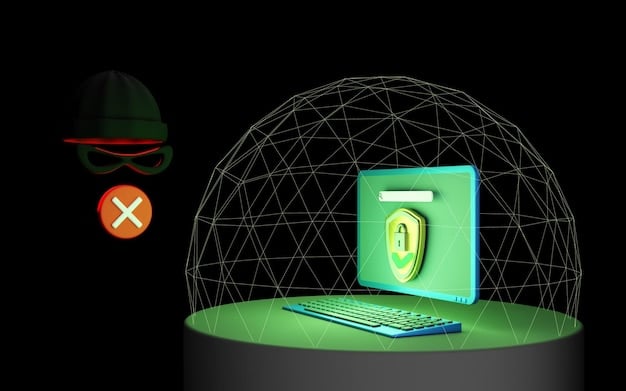
Digital Identity Verification
Blockchain technology offers a secure and efficient solution for digital identity verification in the US. This can streamline various processes, from online banking to government services.
In today’s digital age, verifying identity online is a critical challenge. Traditional methods rely on centralized databases, which are vulnerable to hacking and identity theft. Blockchain can provide a more secure and decentralized approach to identity verification.
Secure Identity Management
Blockchain allows individuals to create and manage their digital identities securely. Personal information is stored on the blockchain, protected by cryptographic keys, and controlled by the individual.
Streamlined Verification
By providing a trusted and verifiable source of identity information, blockchain can streamline processes such as KYC (Know Your Customer) compliance for financial institutions. This reduces the need for repetitive identity checks and improves efficiency.
Civic, for instance, uses blockchain to create a secure and user-friendly platform for managing digital identities. Users can control who has access to their personal information and can easily verify their identity with various service providers.
Blockchain technology can revolutionize digital identity verification, providing a more secure, efficient, and user-centric approach. This can reduce the risk of identity theft and streamline various online processes.
Smart Contracts in Real Estate
The real estate industry in the US can greatly benefit from the implementation of smart contracts using blockchain technology. These contracts can automate and streamline many complex processes involved in property transactions.
Real estate transactions are often characterized by lengthy paperwork, intermediaries, and potential for fraud. Smart contracts can automate many of these processes, reducing costs, increasing transparency, and improving efficiency. By using self-executing contracts written into the blockchain, the real estate industry can modernize its operations.
Automating Transactions
Smart contracts can automate various aspects of real estate transactions, such as property sales, lease agreements, and mortgage payments. This reduces the need for intermediaries and speeds up the process.
Increasing Transparency
By recording all transaction details on the blockchain, smart contracts can increase transparency and reduce the risk of fraud. All parties have access to the same information, ensuring a fair and transparent process.
- Escrow Automation: Manage and release funds automatically based on predefined conditions.
- Title Verification: Securely verify property titles and ownership records.
- Automated Payments: Schedule and execute mortgage payments automatically.
Propy, for example, uses blockchain-based smart contracts to streamline real estate transactions. The platform allows buyers and sellers to conduct transactions securely and efficiently, reducing the need for traditional intermediaries.
Smart contracts are poised to transform the real estate industry by automating processes, increasing transparency, and reducing costs. This can lead to a more efficient and user-friendly real estate market.
Challenges and Opportunities
While blockchain technology offers numerous benefits for various industries in the US, there are also challenges that need to be addressed to fully realize its potential. These challenges include regulatory uncertainty and scalability.
Despite its potential, blockchain technology faces several obstacles to widespread adoption. These include regulatory uncertainty, scalability issues, and a lack of awareness among the public. Addressing these challenges is critical to unlocking the full potential of blockchain in the US.
Regulatory Uncertainty
The regulatory landscape for blockchain technology is still evolving, and there is a lack of clarity in many areas. This uncertainty can stifle innovation and make it difficult for companies to invest in blockchain solutions.
Scalability Issues
Some blockchain networks, such as Bitcoin, can be slow and expensive to use, limiting their scalability. Newer blockchain technologies are addressing these issues by using more efficient consensus mechanisms and network architectures.
Despite these challenges, the opportunities for blockchain technology in the US are vast. By working to address regulatory uncertainty and improve scalability, the US can become a leader in the development and adoption of blockchain solutions.
Blockchain technology is full of opportunities, though navigating regulatory hurdles and aiming for scalability are essential. Overcoming these hurdles will set the stage for extensive adoption.
| Key Point | Brief Description |
|---|---|
| 📦 Supply Chain | Enhances transparency and traceability of products. |
| 🏥 Healthcare | Secures patient data and improves interoperability. |
| 🗳️ Voting Systems | Increases security and transparency of elections. |
| 🔑 Digital Identity | Provides secure and efficient digital identity verification. |
Frequently Asked Questions
▼
A blockchain is a decentralized, distributed, and immutable digital ledger that records transactions across many computers. This makes the recorded data very secure and transparent.
▼
Blockchain provides end-to-end visibility and traceability of products. This can help companies identify and address inefficiencies, reduce the risk of fraud, and ensure product authenticity.
▼
Blockchain improves data security, interoperability, and patient control over their medical records. It also streamlines administrative processes and reduces the risk of data breaches.
▼
Yes, blockchain can make voting systems more secure by creating an immutable record of each vote. This prevents tampering and ensures accuracy. It can also enhance transparency and voter trust.
▼
The primary challenges include regulatory uncertainty, scalability limitations, and a need for greater public awareness and understanding of blockchain technology. Overcoming these issues is vital for wider adoption.
Conclusion
In conclusion, blockchain technology offers a wide array of applications beyond just cryptocurrency in the US, promising to revolutionize industries like supply chain management, healthcare, and voting systems. While challenges remain, the potential benefits of increased transparency, security, and efficiency make blockchain a technology to watch closely as it continues to evolve and find new uses.




